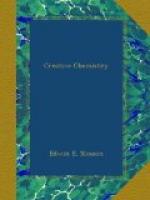IX
THE RIVAL SUGARS
The ancient Greeks, being an inquisitive and acquisitive people, were fond of collecting tales of strange lands. They did not care much whether the stories were true or not so long as they were interesting. Among the marvels that the Greeks heard from the Far East two of the strangest were that in India there were plants that bore wool without sheep and reeds that bore honey without bees. These incredible tales turned out to be true and in the course of time Europe began to get a little calico from Calicut and a kind of edible gravel that the Arabs who brought it called “sukkar.” But of course only kings and queens could afford to dress in calico and have sugar prescribed for them when they were sick.
Fortunately, however, in the course of time the Arabs invaded Spain and forced upon the unwilling inhabitants of Europe such instrumentalities of higher civilization as arithmetic and algebra, soap and sugar. Later the Spaniards by an act of equally unwarranted and beneficent aggression carried the sugar cane to the Caribbean, where it thrived amazingly. The West Indies then became a rival of the East Indies as a treasure-house of tropical wealth and for several centuries the Spanish, Portuguese, Dutch, English, Danes and French fought like wildcats to gain possession of this little nest of islands and the routes leading thereunto.
The English finally overcame all these enemies, whether they fought her singly or combined. Great Britain became mistress of the seas and took such Caribbean lands as she wanted. But in the end her continental foes came out ahead, for they rendered her victory valueless. They were defeated in geography but they won in chemistry. Canning boasted that “the New World had been called into existence to redress the balance of the Old.” Napoleon might have boasted that he had called in the sugar beet to balance the sugar cane. France was then, as Germany was a century later, threatening to dominate the world. England, then as in the Great War, shut off from the seas the shipping of the aggressive power. France then, like Germany later, felt most keenly the lack of tropical products, chief among which, then but not in the recent crisis, was sugar. The cause of this vital change is that in 1747 Marggraf, a Berlin chemist, discovered that it was possible to extract sugar from beets. There was only a




